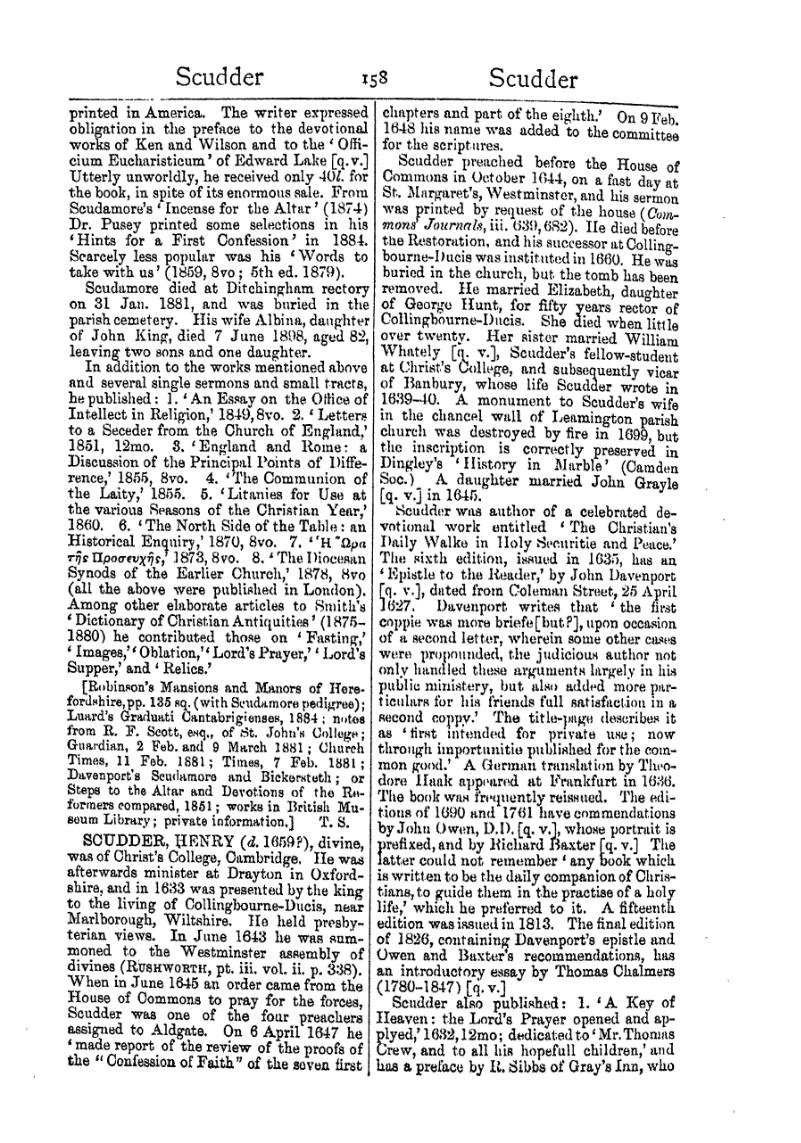printed in America. The writer expressed obligation in the preface to the devotional works of Ken and Wilson and to the ‘Officium Eucharisticum’ of Edward Lake [q. v.] Utterly unworldly, he received only 40l. for the book, in spite of its enormous sale. From Scudamore's ‘Incense for the Altar’ (1874) Dr. Pusey printed some selections in his ‘Hints for a First Confession’ in 1884. Scarcely less popular was his ‘Words to take with us’ (1859, 8vo; 5th ed. 1879).
Scudamore died at Ditchingham rectory on 31 Jan. 1881, and was buried in the parish cemetery. His wife Albina, daughter of John King, died 7 June 1898, aged 82, leaving two sons and one daughter.
In addition to the works mentioned above and several single sermons and small tracts, he published:
- ‘An Essay on the Office of Intellect in Religion,’ 1849, 8vo.
- ‘Letters to a Seceder from the Church of England,’ 1851, 12mo.
- ‘England and Rome: a Discussion of the Principal Points of Difference,’ 1855, 8vo.
- ‘The Communion of the Laity,’ 1855.
- ‘Litanies for Use at the various Seasons of the Christian Year,’ 1860.
- ‘The North Side of the Table: an Historical Enquiry,’ 1870, 8vo.
- ‘Ἡ Ὥρα τῆς Προσευχῆς,’ 1873, 8vo.
- ‘The Diocesan Synods of the Earlier Church,’ 1878, 8vo (all the above were published in London).
Among other elaborate articles to Smith's ‘Dictionary of Christian Antiquities’ (1875–1880) he contributed those on ‘Fasting,’ ‘Images,’ ‘Oblation,’ ‘Lord's Prayer,’ ‘Lord's Supper,’ and ‘Relics.’
[Robinson's Mansions and Manors of Herefordshire, pp. 135 sq. (with Scudamore pedigree); Luard's Graduati Cantabrigienses, 1884; notes from R. F. Scott, esq., of St. John's College; Guardian, 2 Feb. and 9 March 1881; Church Times, 11 Feb. 1881; Times, 7 Feb. 1881; Davenport's Scudamore and Bickersteth; or Steps to the Altar and Devotions of the Reformers compared, 1851; works in British Museum Library; private information.]
SCUDDER, HENRY (d. 1659?), divine, was of Christ's College, Cambridge. He was afterwards minister at Drayton in Oxfordshire, and in 1633 was presented by the king to the living of Collingbourne-Ducis, near Marlborough, Wiltshire. He held presbyterian views. In June 1643 he was summoned to the Westminster assembly of divines (Rushworth, pt iii. vol. ii. p. 338). When in June 1645 an order came from the House of Commons to pray for the forces, Scudder was one of the four preachers assigned to Aldgate. On 6 April 1647 he 'made report of the review of the proofs of the "Confession of Faith" of the seven first chapters and part of the eighth.' On 9 Feb. 1648 his name was added to the committee for the scriptures.
Scudder preached before the House of Commons in October 1644, on a fast day at St. Margaret's, Westminster, and his sermon was printed by request of the house (Commons Journals, iii. 639, 682). He died before the Restoration, and his successor at Collingbourne-Ducis was instituted in 1660. He was buried in the church, but the tomb has been removed. He married Elizabeth, daughter of George Hunt, for fifty years rector of Collingbourne-Ducis. She died when little over twenty. Her sister married William Whately [q. v.], Scudder's fellow-student at Christ's College, and subsequently vicar of Banbury, whose life Scudder wrote in 1639-40. A monument to Scudder's wife in the chancel wall of Leamington parish church was destroyed by fire in 1699, but the inscription is correctly preserved in Dingley's 'History in Marble' (Camden Soc.) A daughter married John Grayle [q. v.] in 1645.
Scudder was author of a celebrated devotional work entitled 'The Christian's Daily Walke in Holy Securitie and Peace.' The sixth edition, issued in 1635, has an 'Epistle to the Header,' by John Davenport [q. v.], dated from Coleman Street, 25 April 1627. Davenport writes that 'the first coppie was more briefe [but?], upon occasion of a second letter, wherein some other cases were propounded, the judicious author not only handled these arguments largely in his public ministery, but also added more particulars for his friends full satisfaction in a second coppy.' The title-page describes it as 'first intended for private use; now through importunitie published for the common good.' A German translation by Theodore Haak appeared at Frankfurt in 1636. The book as frequently reissued, The editions of 1690 and 1761 have commendations by John Owen, D.D. [q. v.], whose portrait is prefixed, and by Richard Baxter [q. v.] The latter could not remember 'any book which is written to be the daily companion of Christians, to guide them in the practise of a holy life,' which he preferred to it. A fifteenth edition was issued in 1813. The final edition of 1820, containing Davenport's epistle and Owen and Baxter's recommendations, has an introductory essay by Thomas Chalmers (1780–1847) [q. v.]
Scudder also published:
- 'A Key of Heaven: the Lord's Prayer opened and applied,' 1682, 12mo; dedicated to 'Mr. Thomas Crew, and to all his hopefull children,' and has a preface by R. Sibbs of Gray's Inn, who
